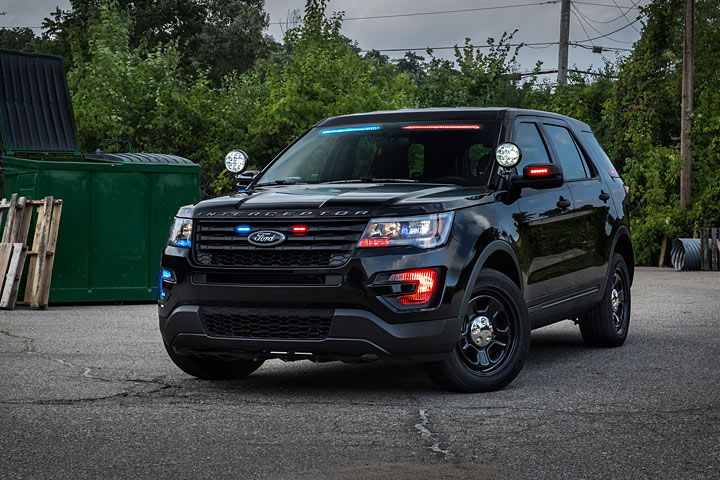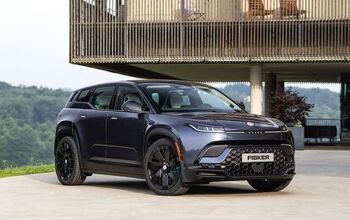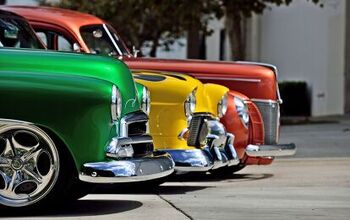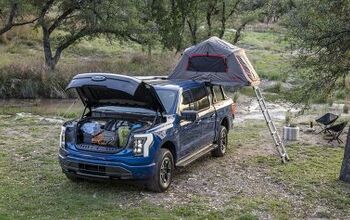QOTD: Would You Intercept This Explorer?

Why merely explore when you can intercept?
A few readers of last week’s lookalike-Ford article mentioned that you can actually get the word “I N T E R C E P T O R” across the bonnet edge of a new Ford Explorer Police, er, Ford Police Interceptor Utility. This is good news for all those people who buy used cop cars and then try to restore them to approximate “on-duty” appearance in hopes of intimidating fellow motorists. (Within the tight-knit community of people who buy and restore ex-police Crown Vics, the guys who pretend to be cops are called “whackers.” The dividing line between mere enthusiast and whacker, as far as I can tell, appears to be the re-installation of lights.)
What about the rest of you? When Interceptors start hitting the auctions, will you bite? Or do you have some, shall we say, concerns?
Ex-police Explorers, albeit sans impressive hood badges, are already hitting the auctions in a range of conditions from doubtful to front-end impact. The question is whether it’s a smart idea to buy one. For many years, retired police Caprices and Crown Vics formed the backbone of many a municipal taxi fleet. They were also an affordable choice for young people who wanted a lot of metal for the money. I’ve heard a lot of stories about people who bought full-size, rear-wheel-drive cop cars and put another ten trouble-free years on them.
Ford’s D3 platform can be remarkably reliable — just ask my brother, who has over 100,000 miles on his Flex, still on the original brake pads! — but it’s also far from simple and it’s not the sort of thing that any grease monkey out there can fix with his eyes closed. Reports from the field on W-body Impala cop cars seem to indicate that they just aren’t holding up the way the Crown Vics did once they reach private hands. So will the Explorer honor its Crown Vic heritage, or stay true to its FWD origins? At what price would you buy an Interceptor? And what would you expect from it?

More by Jack Baruth
Latest Car Reviews
Read moreLatest Product Reviews
Read moreRecent Comments
- 2ACL I won't miss it; it was decent at launch, but in addition to the bad packaging, GM did little to keep it relevant in the segment. I'd prefer that another domestic automaker doesn't just give up on the mainstream sedan, but unlike some of Ford's swan songs, the Malibu made an indifferent case for why they should live.
- ToolGuy TG grows weary of purchasing gasoline. I don't care so much how or why, I am just tired of it. I still buy petroleum products, not 'boycotting oil,' but backing away from gasoline where I can. Sample size = 1.
- Probert Maybe it's not too late for the Dodge Neon I've always dreamed of!!! To the keyboard Robin!
- Akear The malibu still outsells all GM EVs combinedMalibu -150,000GM EV's - 75,000Maybe this represents how execrable GM EVs really are. Barra should have resigned years ago,
- Fred Short term bean counters give up the market and long term players gain shares.


































Comments
Join the conversation
No, I would actually prefer an off rental Explorer. Watch the video "Ford Police Interceptor Utility Quirks - What civilians need to know before buying!" off duty these cars are a pain to use, the auto locking rear lift gate, no key-less entry, no aux cord, forget it. The interior finish of interceptors is not worth the "cool" factor of the exterior. I would rather just have a civi one with heated seats and light up cup holders.
I worked for Lexington, KY PD for 27 years. We went to "home fleet" cars in 1972 based on an Omni Presence concept. Officers were allowed to drive them home, drive them off duty, and anywhere in the county. The caveat was, if you were near an emergency call, you were expected to respond. You could leave the county with permission for police business, or to attend classes out of county. Counting special duty vehicles an motorcycles, our fleet was slightly above 500 units. Any officer issued a cruiser was responsible for the cleanliness, inside and out, as well as under the hood. We had quarterly stand up inspections of these cars and they had to be standing tall, as well as services performed at regular 3K mile intervals. 90% of those cars were very well kept, clean, serviced, and ready for duty. You were expected to get a minimum of 100K miles, and you kept the car a minimum of 3 years assuming you received it new. For new officers coming in, they may receive a car from the pool fleet, or from a retiree, and generally they had first dibs when new cars arrived. We tried turn the fleet over every 4 years, but most often they were at least 5 years old before going to auction. Officers were allowed to upgrade AM/FM radios at their own expense, but they had to be professionally installed in the original location. CB radios could be added at officer expense as well. I was the fleet commander during my final 12 years of service, and as such, while not responsible for maintenance and repair, my office was responsible for working with fleet services regarding any perceived mis-use or abuse, as well as monitoring repairs and repair costs. I also wrote specs, and received new purchases, as well as received old units and determined which would be removed from service. I handled all vehicle assignments as well. All wrecked, and other vehicle damage came through my office, and we handled estimates and repairs with private vendors. I purchased a 77 Plymouth Fury II retired police car for my son's first car. We removed all police id from our vehicles before they went to auction with the exception of the spot light. I removed the wiring from the spot light, and he and I made it a project to sand the car and get it ready for him to drive as a 17 year old teenager. After repaint we went through the brake system, installed new tires and the car was pretty danged good looking when we finished. He drove it for 4 years before we sold it to get him something cheaper to drive. This car had only the 318 two bbl carb, but was still a gas hog... Bottom line, I would not hesitate to buy a retired police unit if I knew its history. It might take some legwork, but police departments and fleet services keep pretty good computerized records on cars these days. I would not want to buy a 24 hour per day pool type police unit, but an individually driven car would not be out of the question...